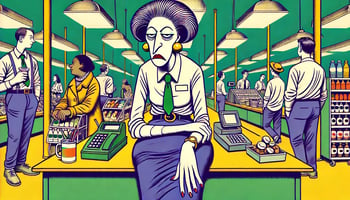Have you noticed the surge in second-hand sales lately? Everyone is jumping on the bandwagon of...
2025 Retail Trends That Will Shape Customer Loyalty


Have you noticed the surge in second-hand sales lately? Everyone is jumping on the bandwagon of...

According to Gallup's recent State of the Global Workplace report, a staggering $8.9 trillion is...

As we approach 2025, the retail landscape continues to evolve, driven by technological advancements and shifting consumer expectations. Senior retail executives must stay ahead of these developments to maintain a competitive edge. Here are key trends shaping the customer experience in 2025.
1. Hyper-Personalisation through Advanced AIArtificial Intelligence (AI) has progressed from basic recommendation engines to sophisticated systems that accurately predict individual customer preferences. By analysing vast datasets, AI enables retailers to offer personalised product suggestions, dynamic pricing, and tailored marketing messages, enhancing customer satisfaction and loyalty. For instance, AI-driven virtual shopping assistants can provide real-time, personalised support, creating a seamless shopping experience.
Real Life example:
Sephora uses AI to offer personalised product recommendations through its Virtual Artist app, allowing customers to try makeup virtually and receive tailored suggestions.
2. Integration of Augmented Reality (AR) in Physical StoresAugmented Reality transforms in-store experiences by allowing customers to visualise products in their intended environments. Retailers are implementing AR-powered smart mirrors and interactive displays, enabling shoppers to virtually try on clothing or see how furniture fits in their homes. This technology enhances engagement and reduces return rates by helping customers make informed purchasing decisions.
Real Life example:
IKEA's Place app allows customers to visualise how furniture looks and fits in their homes, enhancing the shopping experience and aiding decision-making.
3. Expansion of Voice CommerceThe rise of voice-activated devices has led to the growth of voice commerce. Consumers increasingly use voice commands to search for products, place orders, and receive personalised recommendations. Retailers integrating voice commerce into their sales strategies can offer a more convenient and hands-free shopping experience, meeting the demand for accessibility and efficiency.
Real Life example:
Ocado, the online supermarket, has integrated with Amazon's Alexa, allowing customers to add items to their shopping list and place orders using voice commands.
4. Commitment to Sustainability and Ethical PracticesConsumers are placing greater emphasis on sustainability and ethical sourcing. Retailers adopting eco-friendly practices, such as reducing packaging waste and ensuring fair labour conditions, are gaining favour with environmentally conscious customers. Transparent communication about these efforts is crucial, as customers seek brands that align with their values and contribute positively to society.
Real Life example:
H&M has launched a garment collection initiative, allowing customers to drop off unwanted clothing for recycling or repurposing, promoting a circular economy.
5. Adoption of Agile Retail ModelsAgile retail, characterised by rapid response to market trends and consumer demands, is becoming essential. By leveraging data analytics and flexible supply chains, retailers can quickly adapt to changing preferences, ensuring they remain relevant and competitive. This approach minimises overproduction and waste, aligning with sustainability goals and improving operational efficiency.
Real Life example:
Zara's agile supply chain allows it to design, produce, and distribute new products quickly, responding to emerging trends and customer preferences with remarkable speed.
6. Emphasis on Employee ExperienceRecognising that engaged employees lead to satisfied customers, retailers are investing in employee well-being and development. Providing comprehensive training, fostering a positive work environment, and offering growth opportunities enhance employee satisfaction, translating into better customer service and increased loyalty.
Real Life example:
John Lewis Partnership, the employee-owned UK retailer, invests in staff development and well-being, fostering a culture of engagement that translates into high-quality customer service.
By embracing these trends, retailers can position their organisations to thrive in the challenging retail environment in 2025, deliver exceptional customer experiences, and achieve sustainable growth.
If you would like an introductory conversation without obligation about how we can assist you in prioritising and implementing business improvements, please get in touch with us at https://www.retailcx.ie/contact.